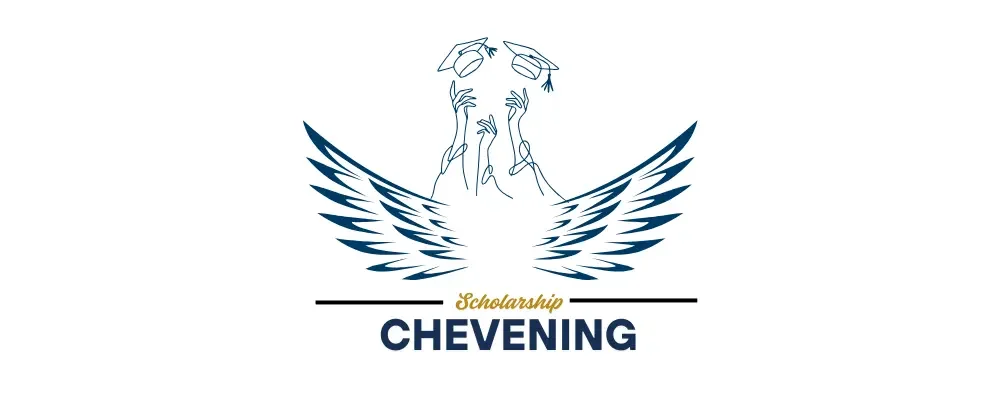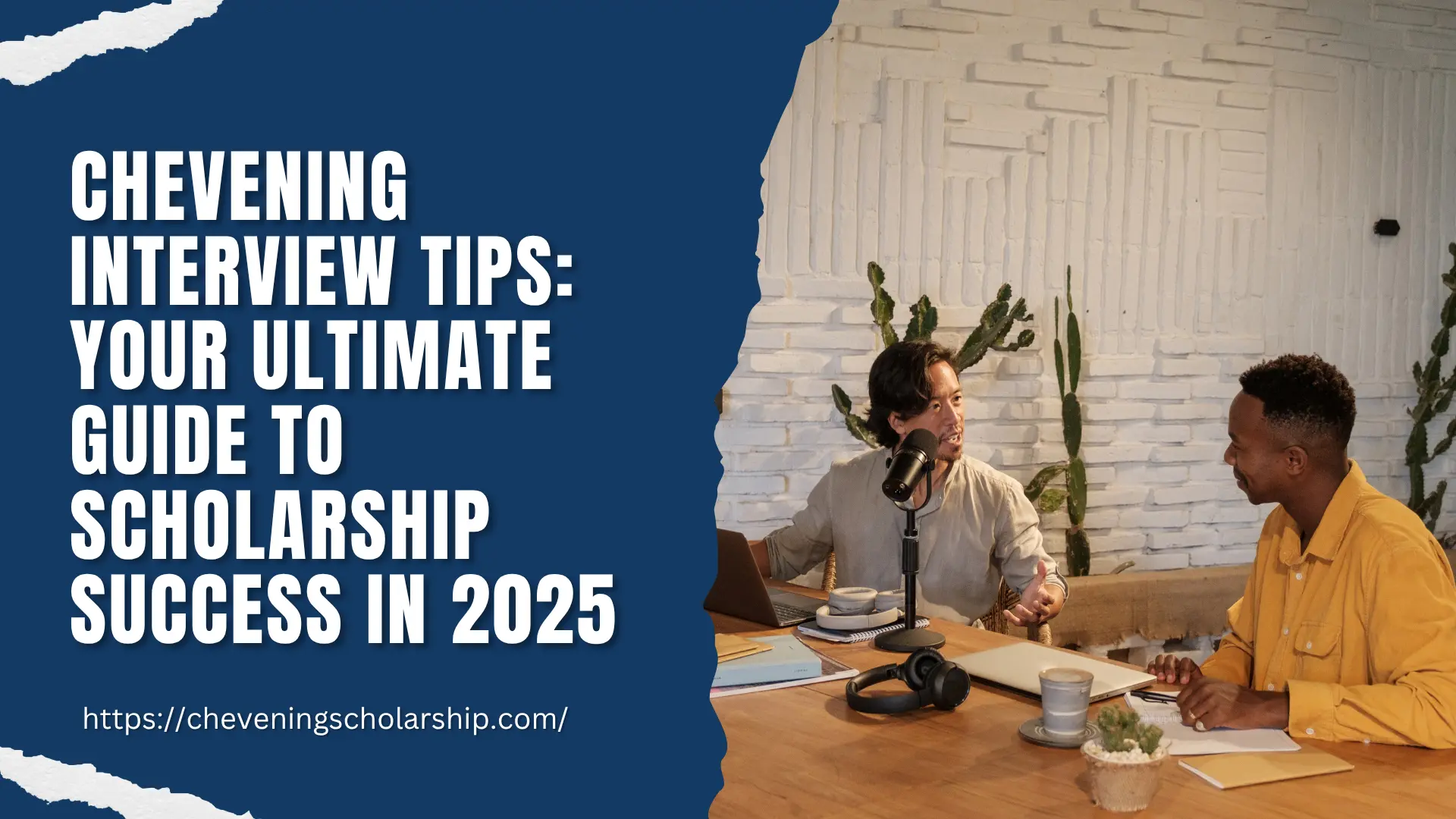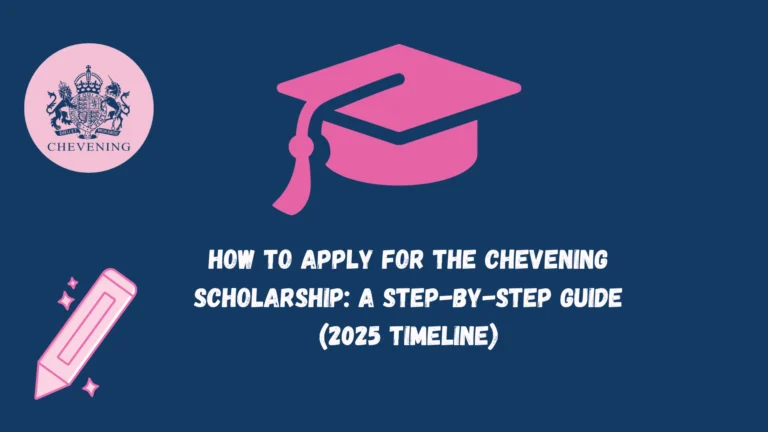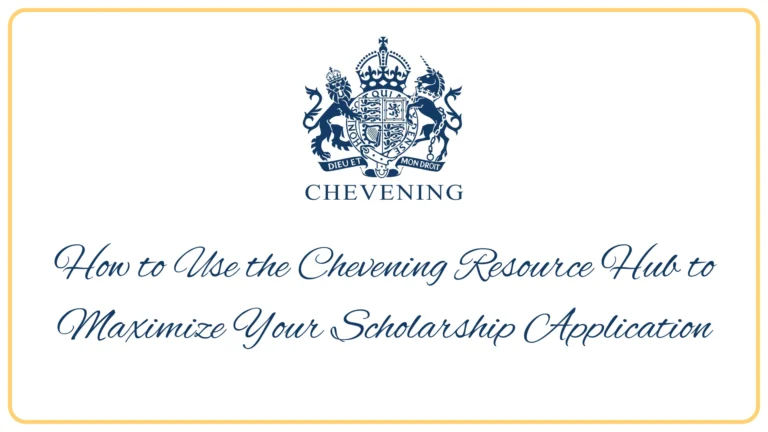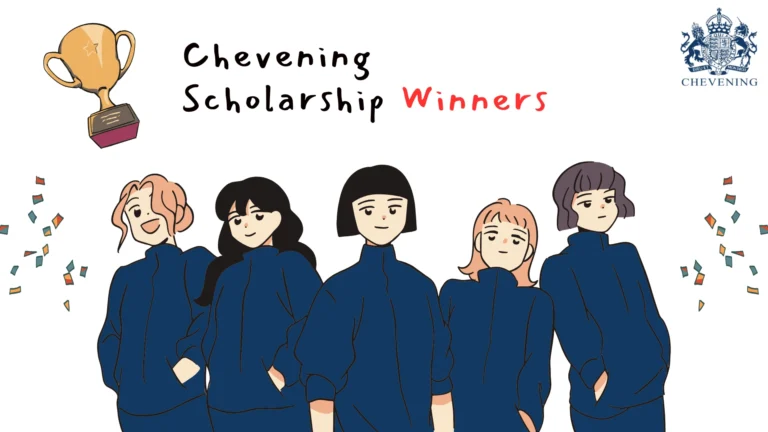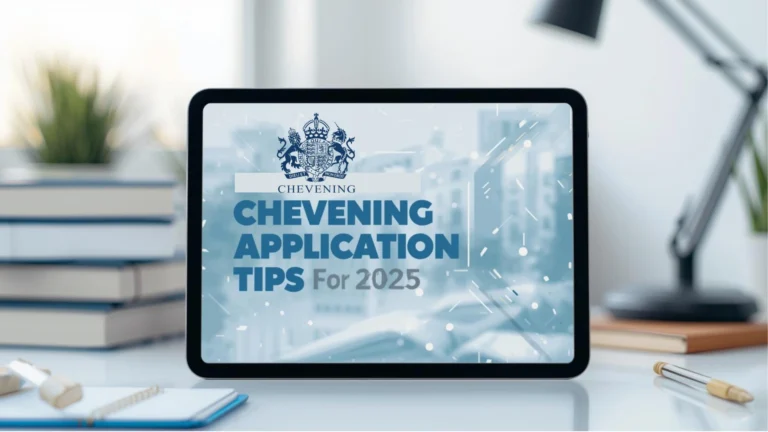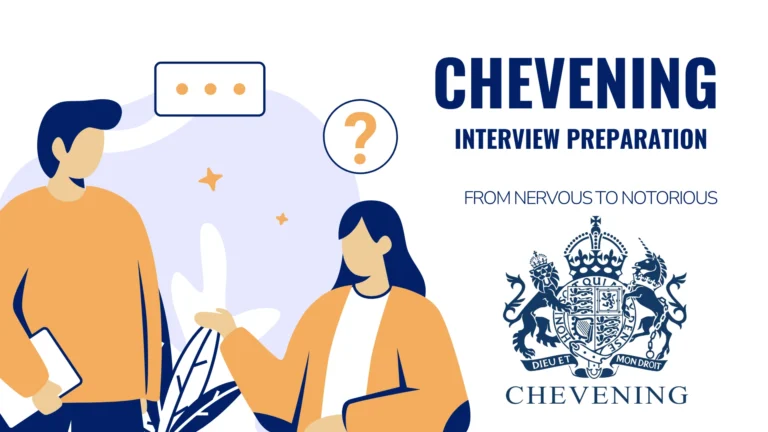Chevening Interview Tips: Your Ultimate Guide to Scholarship Success in 2025
You’re sitting across from a panel of seasoned professionals, your heart doing that uncomfortable tap-dance thing, and someone asks you to explain how your leadership experience will change your country’s future. No pressure, right?
I’ve been there—well, not literally in your shoes, but I’ve watched countless talented international students transform from nervous wrecks into confident Chevening scholars. And here’s the thing: the interview isn’t about being perfect. It’s about being memorable, authentic, and ridiculously well-prepared.
The Chevening scholarship interview is your golden ticket to studying in the UK, but it’s also one of the most nerve-wracking experiences you’ll face in your academic journey. With acceptance rates hovering around 3-4%, you need more than just good grades and a compelling essay. You need to own that interview room (or Zoom screen, because let’s be real, online interviews are here to stay).
So grab your favorite beverage, get comfortable, and let’s dive into everything you need to know about acing your Chevening interview. Trust me, by the end of this guide, you’ll walk into that interview with the confidence of someone who actually knows what they’re doing.
Understanding the Chevening Interview Process
Before we jump into the tactical stuff, let’s talk about what you’re actually signing up for.
The Chevening scholarship interview typically lasts 20-30 minutes and involves a panel of 2-4 interviewers. These aren’t just random people—they’re often British Embassy staff, Chevening alumni, academics, or professionals with deep knowledge of your field and country. They’ve seen hundreds of candidates, and their job is simple: figure out if you’re worth the UK government’s investment.
Here’s what makes Chevening interviews different:
You’re not just being evaluated on your academic credentials or professional achievements. The panel wants to see your potential impact on your home country, your networking abilities, and whether you embody those three magic words: leadership, networking, and future influence.
Think of it less like a traditional job interview and more like a high-stakes conversation where you need to prove you’re not just brilliant—you’re strategically brilliant. You need to show them that investing £30,000+ in your education will create ripple effects that benefit your country, your field, and the UK-your country relationship.
The interview can happen in person at your local British Embassy or High Commission, or increasingly, via video call. Both formats have their quirks, which we’ll get into later.
How to Prepare for Chevening Interview: The Foundation
Let me be blunt: winging it is not a strategy. I don’t care how naturally charismatic you are or how impressive your CV looks. Chevening interview preparation requires methodical, deliberate work.
Start With Your Application
Your interview will be heavily based on what you wrote in your application. Go back and read every single word of your essays. Seriously, every word. The panel will have your application in front of them, and they’ll drill down into specific claims you made.
Said you demonstrated leadership during a community project? Be ready to discuss the nitty-gritty details: What was your role? How did you handle conflicts? What would you do differently? The interviewers aren’t trying to catch you in a lie—they want to understand your thought process and see how you reflect on experiences.
Research Like Your Future Depends On It (Because It Does)
Your course and university: Know why you chose that specific program at that particular university. What makes it unique? Which professors are doing research that excites you? How does it fit into your career plan?
UK-your country relations: Understand the bilateral relationship. What are the key partnerships? Trade relationships? Cultural exchanges? This shows you’re thinking beyond yourself.
Current events in your field: If you’re studying environmental policy, you better know about recent climate agreements. Studying international relations? Be aware of recent diplomatic developments.
Your home country’s challenges: What are the pressing issues? How does your field address them? Where do you fit in?
I recommend creating a document where you write out answers to potential questions, but—and this is crucial—don’t memorize them word-for-word. You’ll sound robotic. Instead, internalize the key points and practice explaining them naturally.
The STAR Method: Your New Best Friend
The STAR method (Situation, Task, Action, Result) is a game-changer for behavioral questions. Here’s how it works:
- Situation: Set the context
- Task: Explain what needed to be done
- Action: Describe what YOU specifically did
- Result: Share the outcome and what you learned
Let’s say they ask about a leadership challenge. Here’s a weak answer:
“I led a team project and it went well.”
Here’s a STAR-structured answer:
“During my role as project coordinator at [Organization], we faced a tight deadline to submit a policy proposal while two team members were dealing with personal emergencies (Situation). I needed to ensure we met the deadline without compromising quality or burning out the remaining team (Task). I reorganized our workflow, delegated tasks based on everyone’s strengths, scheduled daily 15-minute check-ins for accountability, and personally took on the data analysis section (Action). We submitted on time, our proposal was accepted, and I learned the importance of adaptive leadership and clear communication during crises (Result).”
See the difference? The second answer is specific, demonstrates reflection, and shows impact.
Common Chevening Interview Questions (And How to Crush Them)
Let’s get into the meat of it. These are the questions that show up again and again in Chevening scholarship interview questions discussions among alumni and candidates.
1. “Why do you want to study in the UK?”
This seems simple, but it’s a trap if you’re not careful. “Because UK education is great” is not an answer—it’s a snooze-fest.
What they’re really asking: What’s specifically compelling about UK education for YOUR goals?
Strong approach: Connect UK education to your specific career goals and country needs. Mention the UK’s research strengths in your field, specific resources available, or how the UK’s approach to your subject differs from what’s available at home.
“The UK leads in sustainable urban planning research, particularly in retrofitting historical cities—directly relevant to my country’s challenge of modernizing infrastructure while preserving cultural heritage. The collaboration between [specific university] and local councils provides practical exposure I can’t get elsewhere.”
2. “Tell us about your leadership experience.”
This is guaranteed to come up. They want specifics, not vague claims about being a “natural leader.”
What they’re really asking: Can you mobilize people toward a common goal? How do you handle challenges?
Strong approach: Choose 2-3 diverse examples that showcase different leadership styles. Include at least one where things didn’t go smoothly—they want to see how you handle adversity and learn from it.
Discuss formal leadership (official positions) and informal leadership (taking initiative without a title). The latter often impresses more because it shows genuine drive.
3. “What is your networking strategy?”
Here’s where a lot of candidates stumble. They either say something generic about “building relationships” or they inadvertently make networking sound transactional and sleazy.
What they’re really asking: Do you understand that Chevening is building a global network of future leaders? Will you contribute to and leverage this network meaningfully?
Strong approach: Show you understand networking as mutual value creation, not just collecting contacts. Mention:
- Professional associations you’re part of
- How you’ve maintained relationships with past colleagues
- Specific ways you plan to engage with the Chevening community
- How networking has opened doors for you before
“I approach networking as building genuine relationships around shared interests. In my current role, I’ve built partnerships with NGOs across three countries by first understanding their challenges and finding alignment. At Chevening, I’m excited to connect with scholars working on [related field] and potentially collaborate on research that bridges our countries’ shared challenges.”
4. “How will you contribute to your country after your scholarship?”
This is the big one. Chevening exists to create positive change, so your answer needs to be concrete and compelling.
What they’re really asking: Is this investment in you worth it? Will you actually return and make an impact?
Strong approach: Be specific. Avoid vague promises like “I’ll help develop my country.” Instead:
- Name specific organizations you plan to work with
- Describe concrete initiatives you want to launch
- Explain how your UK education fills a specific gap
- Show how your work will have multiplier effects
Include short-term (immediately after returning) and long-term (5-10 years) plans.
5. “What are your weaknesses?”
The classic question that makes everyone uncomfortable. Don’t say “I’m a perfectionist” or “I work too hard.” They’ve heard it a million times and it sounds insincere.
What they’re really asking: Are you self-aware? Can you handle constructive feedback?
Strong approach: Choose a real weakness that’s not catastrophic, explain how you’re working on it, and show growth. The vulnerability actually builds trust.
“I tend to take on too much because I’m passionate about my work, which has sometimes led to burnout. I’ve been actively working on this by implementing better time management systems and learning to delegate effectively. It’s still a work in progress, but I’m much better at recognizing my limits than I was two years ago.”
6. “Why should we choose you over other candidates?”
This isn’t an invitation to trash-talk others. It’s your chance to synthesize your unique value proposition.
What they’re really asking: What makes you special? What’s your unique angle?
Strong approach: Focus on your unique combination of experiences, skills, and goals. What perspective do you bring that others don’t?
“My combination of technical engineering background and three years of community-level implementation gives me a unique perspective on sustainable development. I’ve seen firsthand how theoretically sound solutions fail without community buy-in, and I’ve developed approaches to bridge that gap. This practical grounding, combined with UK-level training, positions me to drive meaningful change in my country’s infrastructure sector.”
Chevening Interview Tips 2025: What’s Different This Year
The Chevening interview landscape has evolved, especially post-pandemic. Here’s what you need to know for 2025:
Online Interviews Are Now Standard
Many interviews happen via video call, which comes with its own challenges:
Technical preparation:
- Test your internet connection multiple times
- Use a wired connection if possible
- Have a backup device ready
- Download the platform beforehand (Zoom, Teams, etc.)
- Check your camera angle (eye level is ideal)
- Ensure good lighting (face the light source, don’t have it behind you)
Environmental preparation:
- Choose a quiet, professional background
- Inform household members about your interview time
- Silence all notifications
- Have water nearby (out of frame)
- Keep your application documents open on another screen for reference
Engagement tips for virtual interviews:
- Look at the camera, not the screen, when speaking (creates “eye contact”)
- Sit up straight and use hand gestures naturally
- Smile—it translates through video
- Pause slightly before answering to account for any lag
- Speak clearly and slightly slower than usual
Increased Focus on Post-Pandemic Recovery
Interviewers are particularly interested in how candidates plan to address challenges exposed or worsened by COVID-19. Be ready to discuss:
- How your field has adapted
- Gaps you’ve identified in your country’s response
- Innovative solutions you want to explore
Sustainability and Social Impact Questions
There’s heightened interest in how scholars plan to contribute to sustainable development goals. Even if your field isn’t explicitly environmental or social, consider how your work intersects with broader impact.
Chevening Panel Interview Tips: Understanding Your Audience
The panel isn’t your enemy—they want you to succeed. Remember, they’re volunteers who believe in the program. But they have a job to do, and understanding their perspective helps.
Who’s On Your Panel?
Typically, you’ll face:
- Embassy staff: They understand diplomatic priorities and bilateral relationships
- Chevening alumni: They’ve been in your shoes and will assess cultural fit with the community
- Academics or professionals: They evaluate your technical knowledge and field-specific plans
Each brings a different lens. Your job is to speak to all of them.
What Impresses the Panel
Through conversations with past interviewers, here’s what stands out:
Authenticity: They can spot rehearsed, fake answers instantly. Be genuine.
Specificity: General answers fade from memory. Specific examples, numbers, and details stick.
Reflection: They love candidates who show they’ve learned from experiences, especially failures.
Strategic thinking: Show you understand the bigger picture, not just your immediate goals.
Cultural awareness: Demonstrate you’ve thought about cultural adaptation and what you’ll contribute to UK campuses.
Enthusiasm: Passion is contagious. If you’re genuinely excited about your plans, it shows.
What Annoys the Panel
Equally important to know:
Over-confidence: There’s a line between confident and arrogant. Stay on the right side.
Vague answers: “I want to help my country” without specifics suggests you haven’t thought it through.
Not knowing your application: If you contradict something you wrote or can’t elaborate on your claims, it’s a red flag.
Poor listening: Answering a different question than what was asked shows you’re not actually engaging.
Negativity: Even when discussing challenges, frame them constructively.
Body Language Tips for Chevening Interview Success
You could say all the right words and still bomb if your body language doesn’t match. Chevening interview body language tips might seem superficial, but humans are visual creatures—we communicate as much nonverbally as verbally.
Before You Speak
Posture: Sit up straight but not rigid. Lean slightly forward to show engagement. Slouching reads as disinterest or lack of confidence.
Hand placement: Rest them naturally on the table or your lap. Avoid:
- Crossing your arms (defensive)
- Fidgeting (nervous)
- Hiding them (closed off)
Facial expressions: Your face should be engaged and responsive. Nod occasionally when listening. Smile when appropriate—but naturally, not like a gameshow host.
While Speaking
Eye contact: This is crucial. Make eye contact with whoever asked the question, but periodically include other panel members. In video interviews, look at the camera.
Gestures: Use natural hand gestures to emphasize points, but don’t go overboard. You’re not conducting an orchestra.
Pace: Speak at a moderate pace. When nervous, we tend to speed up. Conscious slow-down slightly. Pausing before answering shows you’re thoughtful, not stalling.
Voice modulation: Vary your tone and energy. Monotone delivery puts people to sleep.
Managing Nervous Energy
Everyone gets nervous. The goal isn’t to eliminate nerves—it’s to channel them productively.
Power poses: Before the interview (not during!), stand in a confident pose for two minutes. Research shows it actually affects your hormones and confidence levels.
Breathing: Deep breaths before and during the interview keep you calm. If you feel panic rising, pause and take a breath before continuing.
Ground yourself: Feel your feet on the floor. This simple physical awareness can reduce anxiety.
Reframe anxiety: Your body’s stress response and excitement response are physiologically similar. Tell yourself you’re excited, not scared.
What to Wear for Your Chevening Scholarship Interview
Let’s talk Chevening interview dress code. The official guidance says “business attire,” but what does that actually mean?
For in-person interviews:
- Men: Suit and tie, polished shoes, conservative colors
- Women: Business suit, conservative dress, or professional separates
- Everyone: Clean, pressed, well-fitting clothes
For online interviews:
- Same principles apply for what’s visible
- Don’t fall into the trap of “professional on top, pajamas on bottom”—it affects your mentality
- Solid colors work better on camera than busy patterns
- Avoid white (it can wash you out) and black (too harsh on most screens)
Cultural considerations:
- If traditional formal wear is standard in your country’s professional settings, that’s absolutely appropriate
- The goal is to look professional and comfortable in your skin
Grooming matters:
- Clean, styled hair
- Minimal jewelry (nothing that jangles or distracts)
- Light cologne/perfume if any
- Clean, trimmed nails
Here’s the thing: dressing well isn’t about vanity. It’s about showing respect for the process and signaling that you understand professional norms. It also boosts your own confidence—there’s real psychology behind “dress for success.”
Mock Interview Tips: Practice Like a Champion
You wouldn’t run a marathon without training, right? Same principle applies here. Chevening scholarship mock interview tips can make the difference between mediocrity and excellence.
Setting Up Effective Mock Interviews
Find the right practice partners:
- Career advisors at your university
- Chevening alumni (reach out on LinkedIn—many are happy to help)
- Professors in your field
- Colleagues who can ask tough questions
Create realistic conditions:
- Wear interview attire
- Use the same setup (in-person or video)
- Set a timer
- Have your mock interviewer use your actual application
- Record yourself (this is painful but incredibly valuable)
Structure your practice:
Start with basics and gradually increase difficulty:
- Round 1: Common questions, focus on clear communication
- Round 2: Behavioral questions using STAR method
- Round 3: Curveball questions and interruptions
- Round 4: Full simulation with time pressure
What to Focus On During Mock Interviews
Content: Are your answers substantive and specific?
Delivery: Is your pacing good? Voice clear? Fillers minimal?
Body language: What does the recording show?
Time management: Are you too brief or rambling?
Recovery: How do you handle unexpected questions?
The 3-2-1 Practice Method
Here’s my favorite technique:
3 weeks before: Practice daily, focus on breadth (cover all possible questions)
2 weeks before: Practice every other day, focus on depth (refine your best answers)
1 week before: Light practice only, focus on maintaining freshness
Day before: REST. Don’t practice. You’ll overthink and exhaust yourself.
Managing Interview Anxiety: Tips for Nervous Candidates
Let’s address the elephant in the room: you’re going to be nervous. And you know what? That’s completely normal and even helpful in small doses.
Chevening interview anxiety tips aren’t about eliminating nerves—they’re about preventing them from sabotaging you.
Pre-Interview Anxiety Management
The week before:
- Maintain your normal routine
- Don’t cram the night before
- Exercise regularly (proven anxiety reducer)
- Get quality sleep
- Limit caffeine
- Practice mindfulness or meditation
The day of:
- Eat a proper meal (nothing too heavy or unfamiliar)
- Arrive early (rushing increases anxiety)
- Bring water
- Use the bathroom right before
- Do a quick physical warm-up (neck rolls, shoulder shrugs)
- Review your key points, not your whole prep
During the Interview
If your mind goes blank: “That’s a great question. Let me take a moment to think about that.” Then pause, breathe, and answer. Five seconds of silence feels longer to you than to them.
If you mess up: Don’t dwell on it. Acknowledge it if necessary and move forward. Perfection isn’t the goal—authenticity and capability are.
If you get a curveball question: “I haven’t encountered that specific scenario, but here’s how I’d approach it…” Then reason through it out loud. They want to see your thought process.
If you feel panic rising: Ground yourself: feel your feet, take a deep breath, focus on the present question. You’re not fighting a lion—you’re having a conversation.
The Confidence-Building Exercise
Before every practice session and the real interview, write down three things:
- Why you deserve this scholarship
- What unique value you bring
- One thing you’re proud of from your journey
Reading this reminds you that you’ve earned your place in that room.
Advanced Strategies: Standing Out from the Crowd
At this point, you’ve got the fundamentals. Let’s talk about how to be memorable in the right ways.
The Storytelling Advantage
Facts tell, stories sell. When answering questions, weave in narrative elements:
Instead of: “I have experience in policy development.”
Try: “I’ll never forget the community meeting where a 70-year-old farmer explained how our proposed policy would devastate his livelihood. That moment taught me that effective policy development requires listening before designing. It’s why I spent the next three months visiting farms before we finalized our recommendations.”
Stories activate more parts of the brain, making you more memorable. They also demonstrate emotional intelligence and communication skills.
The Question Flip
At the end, they’ll ask: “Do you have questions for us?”
This is NOT a throwaway moment. Having no questions suggests lack of interest or preparation.
Weak questions:
- “How many people apply?” (Google this)
- “When will I hear back?” (You’ll be told)
Strong questions:
- “What qualities do you see in scholars who’ve made the greatest impact in my country/field?”
- “How can I best prepare to maximize my Chevening year beyond academics?”
- “Are there specific challenges you see in UK-[your country] relations that my field could address?”
These show strategic thinking and genuine engagement.
The Follow-Up Excellence
Immediately after the interview: Send a brief thank-you email within 24 hours. Keep it short, professional, and specific:
“Dear [Panel Chair name],
Thank you for the opportunity to interview for the Chevening Scholarship yesterday. I appreciated our discussion about [specific topic discussed], and it reinforced my commitment to [specific goal].
I look forward to hearing from you.
Best regards, [Your name]”
This demonstrates professionalism and attention to detail. Don’t overdo it—one short email is perfect.
Common Mistakes to Avoid: Chevening Interview Dos and Don’ts
Let’s save you from some face-palm moments. These are the Chevening interview dos and don’ts that trip up otherwise strong candidates.
The Don’ts
Don’t memorize answers word-for-word: You’ll sound like a robot and panic if you forget your script.
Don’t badmouth anyone: Not previous employers, colleagues, or other scholarship programs. It reflects poorly on you.
Don’t lie or exaggerate: It will catch up with you, and the consequences are severe.
Don’t check your phone: This should be obvious, but apparently it needs saying. Even just having it visible on the table is distracting.
Don’t interrupt the interviewer: Let them finish their questions completely.
Don’t complain about the process: Even if your application took forever or you had technical issues, the interview isn’t the place to vent.
Don’t say “I don’t know” and leave it there: If you don’t know something, acknowledge it and show how you’d find out or work through it.
Don’t focus only on what you’ll gain: Balance what you’ll learn with what you’ll contribute.
Don’t be negative about your country: You can discuss challenges without being pessimistic or critical in a way that suggests you want to leave permanently.
Don’t forget the time: If you’re rambling and the interviewer is trying to move on, read the room.
The Dos
Do be yourself: Authenticity is more impressive than trying to be who you think they want.
Do show enthusiasm: Passion is contagious and memorable.
Do acknowledge gaps in your knowledge: Self-awareness is a strength, not a weakness.
Do connect your answers to Chevening’s goals: Show you understand what the program is about.
Do demonstrate reflection: The ability to learn from experiences shows maturity.
Do research your interviewers: If names are provided, a quick LinkedIn search shows initiative.
Do bring a copy of your application: Have it accessible (but not obviously reading from it).
Do maintain professionalism if things go wrong: Technical issues happen in virtual interviews. Handle them gracefully.
Do show gratitude: Thank them for their time at the end.
Do believe in yourself: If you don’t believe you deserve this, why should they?
Time Management: Making Every Minute Count
Here’s something candidates often overlook: Chevening interview tips time management matters both in preparation and during the interview itself.
Preparation Timeline
3 months before (if possible):
- Begin researching your course and UK education
- Start collecting leadership and networking examples
- Reach out to alumni for insights
6-8 weeks before:
- Create your answer database
- Schedule mock interviews
- Research your interviewers (if names provided)
2-4 weeks before:
- Intensive practice sessions
- Refine your storytelling
- Prepare your questions for them
1 week before:
- Light review only
- Focus on mental preparation
- Handle logistics (location, technology, attire)
Day before:
- Minimal preparation
- Relax and rest
- Prepare materials and clothes
During the Interview
Most interviews last 20-30 minutes. Here’s roughly how it breaks down:
- Introduction and rapport building: 2-3 minutes
- Core questions: 15-20 minutes
- Your questions for them: 3-5 minutes
- Closing: 1-2 minutes
Answer length guidelines:
- Simple factual questions: 30-60 seconds
- Behavioral/experience questions: 2-3 minutes
- Complex questions about plans: 3-4 minutes
Watch for cues. If interviewers are:
- Nodding and taking notes: You’re on track
- Looking at each other or the clock: You might be too long
- Asking follow-ups: They’re engaged
- Trying to interject: Wrap it up
Tips for Specific Candidate Types
Not everyone’s journey to Chevening looks the same. Here’s advice for specific situations:
For Shy or Introverted Candidates
Chevening interview tips for shy candidates focus on leveraging your strengths:
Your advantages:
- You likely listen well (show this!)
- You probably reflect deeply (demonstrate this!)
- You tend to think before speaking (frame this as thoughtful, not slow)
Your strategy:
- Practice with people who make you comfortable first
- Remember: They want to hear your ideas, not judge your personality
- Use the STAR method—structure reduces pressure
- Take strategic pauses (you don’t have to rush)
- Reframe the experience: it’s a conversation, not a performance
For Career Changers
If you’re pivoting fields:
Address it head-on: Explain your transition clearly and show how past experience adds value to your new direction.
Make connections: Show how seemingly unrelated experiences provide unique perspectives.
Demonstrate commitment: Prove this isn’t a whim—show concrete steps you’ve taken toward your new field.
For Candidates With Less Traditional Backgrounds
Maybe you don’t have formal leadership titles or work in a prestigious organization. Your experience is still valuable.
Focus on impact, not titles: Leading a community initiative without official authority is often more impressive than having a fancy job title.
Highlight adaptability: Overcoming resource constraints or challenging circumstances demonstrates resilience.
Own your story: Your unique background might be exactly what makes you stand out.
For Candidates With Gaps in Their CV
Be honest: Explain the gap briefly and professionally.
Show growth: What did you learn during that time?
Move forward: Don’t dwell on it—focus on your current trajectory.
Learning From Chevening Alumni: Real Interview Experiences
I’ve spoken with dozens of Chevening scholars about their interview experiences. Here are patterns that emerge:
What Successful Candidates Did Right
They prepared deeply but stayed flexible: They knew their content but adapted to the conversation flow.
They showed, didn’t just tell: Every claim was backed with specific examples.
They connected personally: They found moments of genuine connection with interviewers.
They demonstrated long-term thinking: They showed how their plans fit into 5, 10, 20-year visions.
They were memorable: Whether through a unique anecdote, unexpected perspective, or genuine passion.
Common Surprises They Experienced
“The interviewers were much friendlier than I expected. They genuinely wanted me to succeed.” – Scholar from Nigeria
“They asked more about my specific plans than I anticipated. Vague answers wouldn’t have cut it.” – Scholar from Pakistan
“The networking question was more important than I realized. It wasn’t just a checkbox—they really wanted to understand how I’d engage with the community.” – Scholar from India
“They asked me how I’d handle culture shock and being away from family. I wasn’t expecting such personal questions.” – Scholar from Bangladesh
Mistakes They Wish They’d Avoided
“I spent too much time memorizing answers and not enough time actually understanding my own story.” – Scholar from Kenya
“I didn’t research the interviewers. Turns out one was a leader in my field, and I missed an opportunity to connect on shared interests.” – Scholar from Brazil
“I was so nervous I rushed through answers. Slowing down would have made a huge difference.” – Scholar from Vietnam
Your Final Week Checklist
The interview is approaching. Here’s your comprehensive Chevening scholarship interview preparation checklist:
Logistics
- [ ] Confirm date, time, and format (in-person or virtual)
- [ ] Know the exact location or have video link bookmarked
- [ ] Test technology if virtual (camera, mic, internet, platform)
- [ ] Plan your route if in-person (arrive 15 minutes early)
- [ ] Prepare backup plans (alternative device, alternate route)
Materials
- [ ] Print copy of your application
- [ ] Prepare portfolio if relevant to your field
- [ ] Have ID and necessary documents
- [ ] Water bottle ready
- [ ] Notepad and pen
Preparation
- [ ] Review your application thoroughly
- [ ] Practice answers to common questions
- [ ] Prepare 3-4 questions for the panel
- [ ] Research recent UK-your country news
- [ ] Review your course and university details
Appearance
- [ ] Professional outfit cleaned and pressed
- [ ] Shoes polished (yes, even for virtual interviews—mindset matters)
- [ ] Hair styled
- [ ] Accessories minimal and professional
Mental Preparation
- [ ] Get good sleep the night before
- [ ] Eat a proper meal before interview
- [ ] Review confidence-building notes
- [ ] Practice breathing exercises
- [ ] Positive visualization
The Day Of
- [ ] Wake up with plenty of time (no rushing)
- [ ] Light review of key points only
- [ ] Arrive/log in early
- [ ] Final tech check if virtual
- [ ] Bathroom break
- [ ] Deep breaths and positive mindset
After the Interview: What Happens Next
The interview is over. You’ve given it your all. Now what?
Immediate aftermath:
- Send your thank-you email within 24 hours
- Make notes on what went well and what didn’t (useful for learning, regardless of outcome)
- Don’t obsess over perceived mistakes—everyone thinks they bombed
- Continue with your life—results can take weeks
What the panel does: After all interviews conclude, the panel reviews candidates, discusses, and ranks them. This isn’t immediate—they’re often interviewing many candidates over several days or weeks.
Timeline expectations: Results typically come several weeks after your interview date. The waiting is agonizing, but it’s normal. Don’t read into silence.
Possible outcomes:
If you’re selected: Congratulations! You’ll receive official notification with next steps for visa application, course selection confirmation, and pre-departure logistics.
If you’re not selected: First, breathe. This doesn’t define your worth or potential. With acceptance rates around 3-4%, exceptional candidates don’t get selected. If you’re eligible, consider reapplying next year. Many successful scholars were rejected before being accepted.
Final Thoughts: Bringing It All Together
Here’s what I want you to remember as you step into your Chevening interview:
You’ve already accomplished something remarkable just by getting to the interview stage. From thousands of applicants, you’ve been selected as a finalist. That’s not luck—that’s your hard work, leadership, and potential being recognized.
The interview isn’t about perfection—it’s about authenticity, preparation, and potential. The panel isn’t looking for robots who say all the “right” things. They’re looking for real people with genuine passion and concrete plans to make a difference.
Your story matters. You’re not just another application number—you’re someone with unique experiences, perspectives, and dreams. Don’t hide behind what you think they want to hear. Show them who you actually are and why that matters.
Preparation is your secret weapon. Talent and passion will only take you so far. The candidates who succeed are those who put in the work: practicing answers, researching thoroughly, and preparing mentally and physically. You can’t control the outcome, but you can control your preparation.
This is a conversation, not an interrogation. Yes, the stakes are high, but the people on the other side of that table (or screen) are humans who believe in this program and want to find the right scholars. They’re not there to trick you or see you fail. They’re there to understand who you are and what you’ll do with this opportunity.
Whatever happens, you’re on the right path. Whether you receive the scholarship or not, the work you’ve put into preparing—the self-reflection, the goal-setting, the leadership development—makes you a stronger candidate for whatever comes next.
